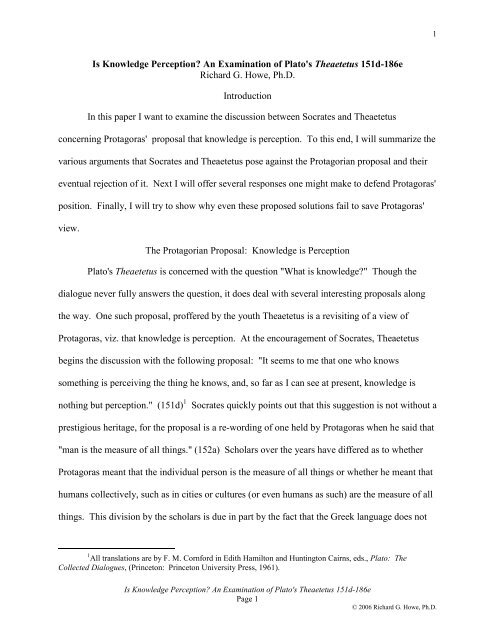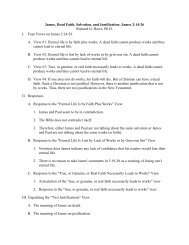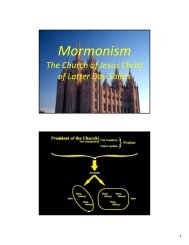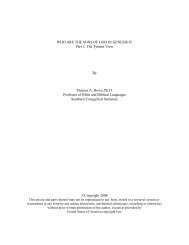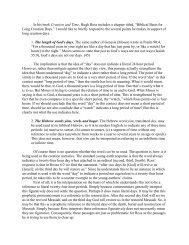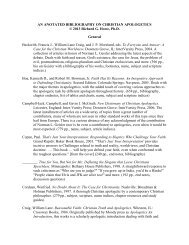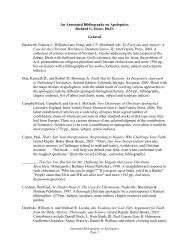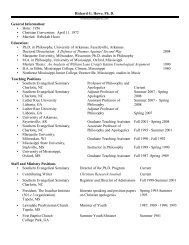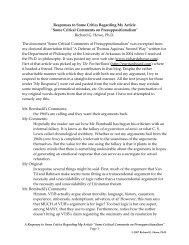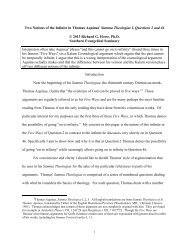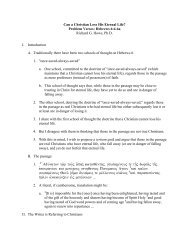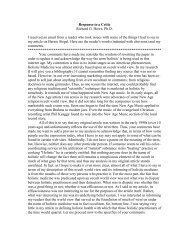Is Knowledge Perception? An Examination of ... - Richard G. Howe
Is Knowledge Perception? An Examination of ... - Richard G. Howe
Is Knowledge Perception? An Examination of ... - Richard G. Howe
You also want an ePaper? Increase the reach of your titles
YUMPU automatically turns print PDFs into web optimized ePapers that Google loves.
1<strong>Is</strong> <strong>Knowledge</strong> <strong>Perception</strong>? <strong>An</strong> <strong>Examination</strong> <strong>of</strong> Plato's Theaetetus 151d-186e<strong>Richard</strong> G. <strong>Howe</strong>, Ph.D.IntroductionIn this paper I want to examine the discussion between Socrates and Theaetetusconcerning Protagoras' proposal that knowledge is perception. To this end, I will summarize thevarious arguments that Socrates and Theaetetus pose against the Protagorian proposal and theireventual rejection <strong>of</strong> it. Next I will <strong>of</strong>fer several responses one might make to defend Protagoras'position. Finally, I will try to show why even these proposed solutions fail to save Protagoras'view.The Protagorian Proposal: <strong>Knowledge</strong> is <strong>Perception</strong>Plato's Theaetetus is concerned with the question "What is knowledge?" Though thedialogue never fully answers the question, it does deal with several interesting proposals alongthe way. One such proposal, pr<strong>of</strong>fered by the youth Theaetetus is a revisiting <strong>of</strong> a view <strong>of</strong>Protagoras, viz. that knowledge is perception. At the encouragement <strong>of</strong> Socrates, Theaetetusbegins the discussion with the following proposal: "It seems to me that one who knowssomething is perceiving the thing he knows, and, so far as I can see at present, knowledge isnothing but perception." (151d) 1Socrates quickly points out that this suggestion is not without aprestigious heritage, for the proposal is a re-wording <strong>of</strong> one held by Protagoras when he said that"man is the measure <strong>of</strong> all things." (152a) Scholars over the years have differed as to whetherProtagoras meant that the individual person is the measure <strong>of</strong> all things or whether he meant thathumans collectively, such as in cities or cultures (or even humans as such) are the measure <strong>of</strong> allthings. This division by the scholars is due in part by the fact that the Greek language does not1 All translations are by F. M. Cornford in Edith Hamilton and Huntington Cairns, eds., Plato: TheCollected Dialogues, (Princeton: Princeton University Press, 1961).<strong>Is</strong> <strong>Knowledge</strong> <strong>Perception</strong>? <strong>An</strong> <strong>Examination</strong> <strong>of</strong> Plato's Theaetetus 151d-186ePage 1© 2006 <strong>Richard</strong> G. <strong>Howe</strong>, Ph.D.
2have an indefinite pronoun, and thus a noun like avjnqrwpo" (man) without any article could beeither definite or indefinite. Further, there are other things that Protagoras says that suggestsboth. 2The Discussion <strong>of</strong> Socrates and TheaetetusThe initial discussion here between Socrates and Theaetetus seemingly takes Protagorasin the former sense, while points made elsewhere about Protagoras suggest the latter sense.Socrates summarizes the notion, "that any given thing 'is to me such as it appears to me, and is toyou such as it appears to you,' you and I being men." (152a) The example he gives is when oneperson feels the wind is chilly and the other does not, or one feels the wind slightly chilly and theother feels it quite cold. (152b) Presumably Protagoras did not mean that the wind was bothchilly and not chilly. Rather, his point here is more epistemological. In fact, some suggest thatProtagoras' point is an epistemological view that corresponds to Heraclitus' metaphysical view <strong>of</strong>reality being in flux. In this sense, the metaphysical model <strong>of</strong> Heraclitus might make therelativism <strong>of</strong> Protagoras plausible. Socrates suggests as much and more when he says "In thismatter let us take it that, with the exception <strong>of</strong> Parmenides, the whole series <strong>of</strong> philosophersagree—Protagoras, Heraclitus, Empedocles …" (152e)Socrates' ObjectionsBut Socrates wants to raise several objections against this proposal that man is themeasure, that knowledge is perception. Socrates raises problems for any theory <strong>of</strong> perception bypointing out how perceptions vary in one when one is in health and when one is ill. Further,Socrates prompts from Theaetetus that surely when one is mad or one is dreaming, one canperceive what is not the case. But if this is so, then this seems to conflict with the Protagorian2 The former sense will be how Socrates and Theaetetus take it in their initial discussion. The latter sense issuggested by Protagoras' discussion about morals being relative to the individual city-state (172a).<strong>Is</strong> <strong>Knowledge</strong> <strong>Perception</strong>? <strong>An</strong> <strong>Examination</strong> <strong>of</strong> Plato's Theaetetus 151d-186ePage 2© 2006 <strong>Richard</strong> G. <strong>Howe</strong>, Ph.D.
3dictum that whatever one perceives is knowledge. <strong>Howe</strong>ver, having introduced these pointswhich seemingly weaken the proposal, Socrates goes on to remedy the situation by suggestingwhat some have come to refer to as "splitting the subject." 3Socrates argues that the Socrateswho is healthy and the Socrates who is ill are two different subjects. In like manner, the Socrateswho is awake and the Socrates who is asleep are also two different subjects. Thus, the winetasting sweet to the healthy Socrates and the wine tasting bitter to the ill Socrates can both betrue. Given this, "since what acts upon me is for me and for no one else, I, and no on else, amactually perceiving it. … Then my perception is true for me, for its object at any moment is myreality, and I am, as Protagoras says, a judge <strong>of</strong> what is for me, that it is, and <strong>of</strong> what is not, thatit is not. … If then, I am infallible and make no mistake in my state <strong>of</strong> mind about what is orbecomes, how can I fail to have knowledge <strong>of</strong> the things <strong>of</strong> which I have perception?" (160c) Tothis the young Theaetetus concludes "You cannot possibly fail."Having dispensed with the first objection and having established the prima facie truth <strong>of</strong>Protagoras' proposal, Socrates begins to systematically levy further objections to the position.First, Socrates wonders why one should think that man is the measure, as opposed to, forexample, a pig or a baboon, or some other creature. (161c) Second, Socrates wonders that if it isthe case that what anyone thinks is true for him, "where is the wisdom <strong>of</strong> Protagoras, to justifyhis setting up to teach others and to be handsomely paid for it, and where is our comparativeignorance or the need for us to go and sit at his feet, when each <strong>of</strong> us is himself the measure <strong>of</strong>his own wisdom?" (161e)But perhaps the most important objection to Protagoras' proposal is what has come to beknown as "the table-turning argument." In short, this objection states that, since whatever3 Lynne Spellman, class lecture, University <strong>of</strong> Arkansas, October 14, 2002.<strong>Is</strong> <strong>Knowledge</strong> <strong>Perception</strong>? <strong>An</strong> <strong>Examination</strong> <strong>of</strong> Plato's Theaetetus 151d-186ePage 3© 2006 <strong>Richard</strong> G. <strong>Howe</strong>, Ph.D.
4anyone thinks is true, then for those who think that Protagoras' own view is false, it follows thatit is true that Protagoras' proposal is false. "Protagoras, for his part, admitting as he does thateverybody's opinion is true, must acknowledge the truth <strong>of</strong> his opponents' belief about his ownbelief, where they think he is wrong. … That is to say, he would acknowledge his own belief tobe false, if he admits that the belief <strong>of</strong> those who think him wrong is true." (171b)Some Modest ProposalsPerceptual Relativism vs. Philosophical RelativismWhat might one say about Protagoras' theory? Has Socrates shown that the theory isentirely implausible? Several comments are in order. First, one might suggest that Socrates hasattacked a straw man. If one maintained that Protagoras' original dictum was confined toperceptual, moral, and aesthetic judgments, as opposed to philosophical or second-orderjudgments, can the position be immune to the above criticisms, especially the table-turningargument? Indeed, Socrates' discussion that eventuates in the table-turning argument seemsquite far from the original example Socrates uses <strong>of</strong> what Protagoras was talking about, viz., theexample <strong>of</strong> how the wind feels different to different people. As I suggested earlier, presumablyProtagoras did not mean that the wind really was both chilly and not chilly. Rather, he wasreferring to the relativity <strong>of</strong> perceptual, or if you will, empirical observations. Even Socratesadmits that the wind might feel chilly to one and not chilly to another. But to take this modestrelativism to mean that anything that anyone says is true for them, is to take the proposal farbeyond the bounds within which it was originally intend to reside. As G. B. Kerferd claims,"Indeed, there is no actual evidence in any ancient author that Protagoras himself ever applied<strong>Is</strong> <strong>Knowledge</strong> <strong>Perception</strong>? <strong>An</strong> <strong>Examination</strong> <strong>of</strong> Plato's Theaetetus 151d-186ePage 4© 2006 <strong>Richard</strong> G. <strong>Howe</strong>, Ph.D.
6theory <strong>of</strong> truth, then one would no longer be obligated to answer the table-turning argument,since the argument itself utilizes a correspondence theory. The "Neo-Protagorean" mightmaintain that such truth-claims are to be understood in terms <strong>of</strong> their coherence with other truthclaimsmade within a given "form <strong>of</strong> life." Since any given claim derives its truth from itsrelation to other claims within the form <strong>of</strong> life, then it is misplaced to try to defeat a given claimfrom outside the form <strong>of</strong> life. Further, if one relegates the boundaries <strong>of</strong> the forms <strong>of</strong> life to theindividual (which, admittedly, is not usually what a Wittgensteinian would do) then noindividual is in a privileged position to adjudicate claims by another individual.While it is beyond the scope <strong>of</strong> this short analysis to examine the subtleties andtechnicalities <strong>of</strong> the philosophy <strong>of</strong> the later Wittgenstein, a brief response is in order. It seems tome that even so grand an attempt to save Protagoras here stills fall short and does not avoid thefatal table-turning argument. For the same reasons why one could not deny at least someobjective empirical observations, one cannot deny some objective philosophical claims either. Inthis context, 'objective' means claims that would transcend all forms <strong>of</strong> life in that they would betrue <strong>of</strong> every form <strong>of</strong> life, and thus not themselves be a function <strong>of</strong> any form <strong>of</strong> life. It seemsclear to me that the very philosophical analysis that would give rise to a theory <strong>of</strong> the forms <strong>of</strong>life is an analysis <strong>of</strong> how one thinks things really are, that is, how forms <strong>of</strong> life really are.Otherwise, the critic could dismiss the analysis as merely being the product <strong>of</strong> theWittgensteinian's own form <strong>of</strong> life. In other words, the Wittgensteinian is either claiming thatthese forms <strong>of</strong> life are really the way everyone relates to the world (epistemologically speaking)or they are not. If they are, then that claim purports to be an objective claim about how the worldis. If not, then the claim itself is nothing but a claim stemming from a particular form <strong>of</strong> life (the<strong>Is</strong> <strong>Knowledge</strong> <strong>Perception</strong>? <strong>An</strong> <strong>Examination</strong> <strong>of</strong> Plato's Theaetetus 151d-186ePage 6© 2006 <strong>Richard</strong> G. <strong>Howe</strong>, Ph.D.
7Wittgensteinian form <strong>of</strong> life) and thus cannot maintain that anyone else really is relating to theworld from within his own form <strong>of</strong> life too.A similar problem arises when one tires to deny a correspondence theory <strong>of</strong> truth. Forpresumably if one were trying to defend the Protagorian thesis, then surely that one would bemaking claims about how the world is. But to make a claim as to how the world is, is to utilize acorrespondence theory <strong>of</strong> truth, not a coherence. No denial can be made about thecorrespondence theory <strong>of</strong> truth without using the correspondence theory <strong>of</strong> truth in the denial.ConclusionI have tried to summarize several criticisms against Protagoras' claim that "man is themeasure." To this end I looked at Socrates' and Theaetetus' discussion <strong>of</strong> the matter, and theirultimate rejection <strong>of</strong> Protagoras. I then attempted to defend the proposal by suggesting severalways that one might construe his original proposal to circumvent the most serious objection, thetable-turning argument. My conclusion <strong>of</strong> the matter is that the proposal <strong>of</strong> Protagoras isuntenable in all but its most modest form as a statement that only some, but not all, <strong>of</strong> ourempirical observations are relative to the individual. But once this qualification is opted for, itseems no longer the claim <strong>of</strong> Protagoras.<strong>Is</strong> <strong>Knowledge</strong> <strong>Perception</strong>? <strong>An</strong> <strong>Examination</strong> <strong>of</strong> Plato's Theaetetus 151d-186ePage 7© 2006 <strong>Richard</strong> G. <strong>Howe</strong>, Ph.D.


